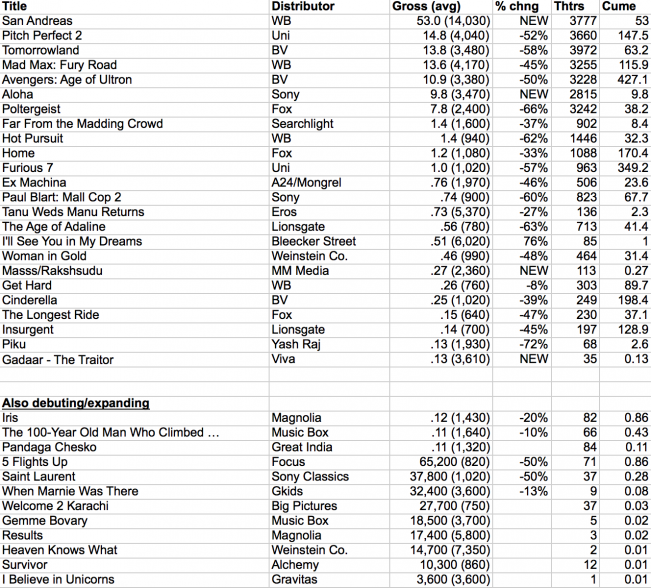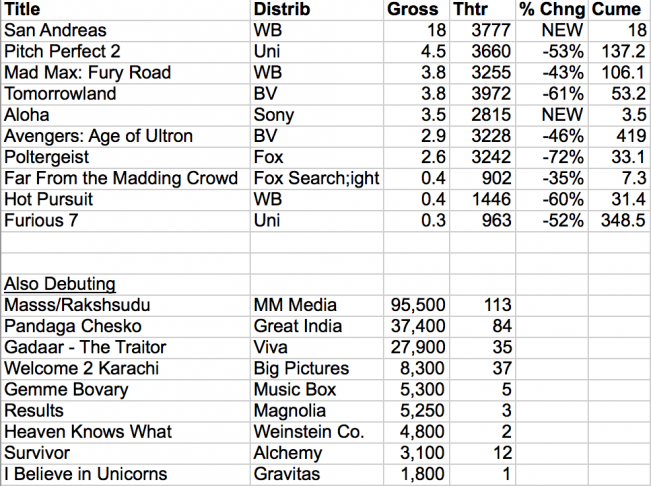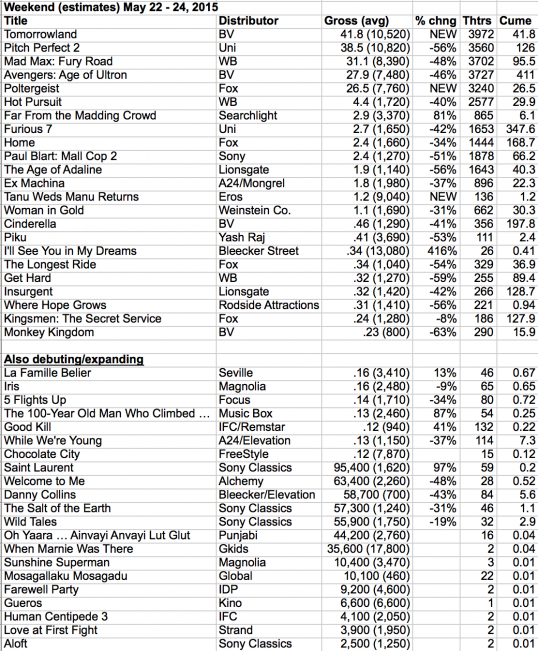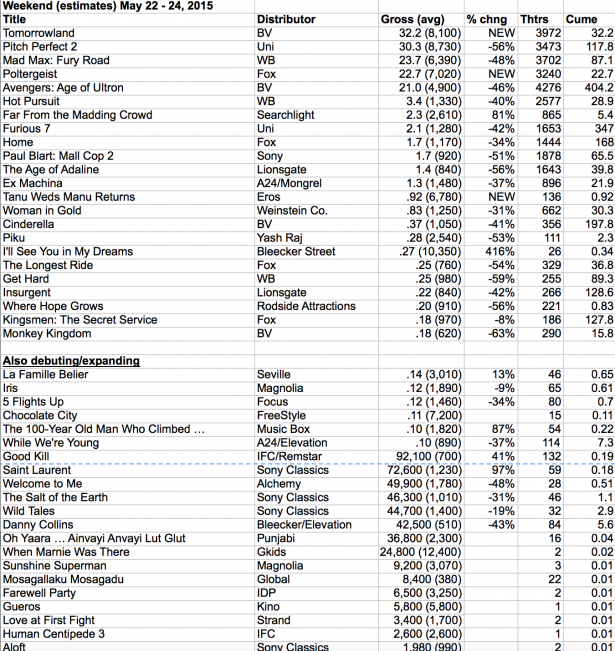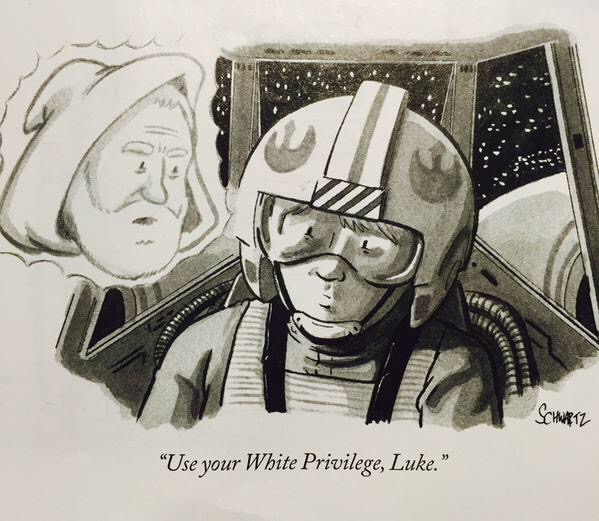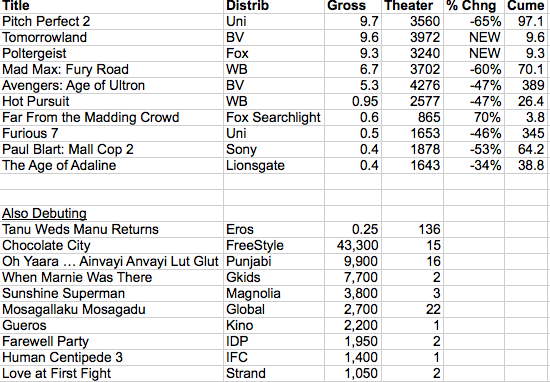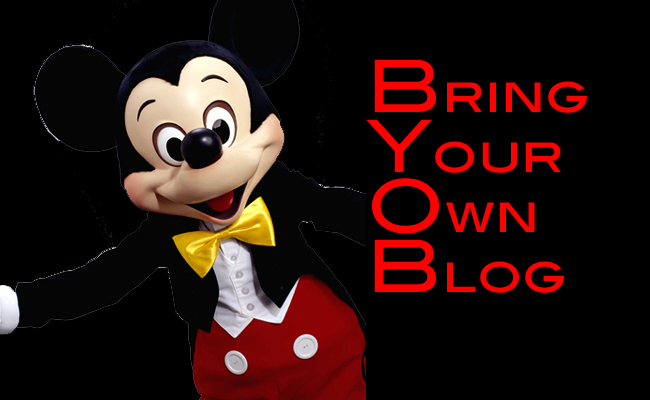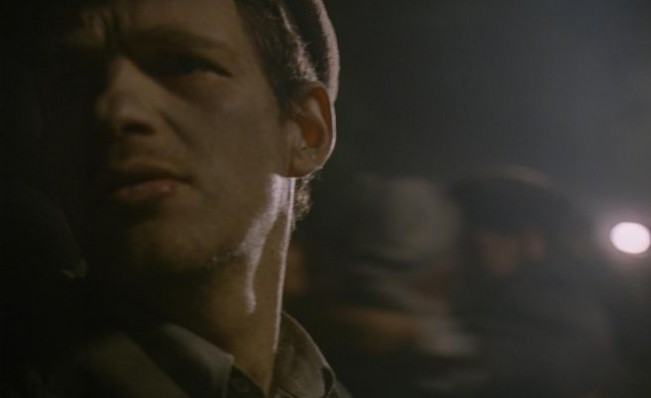The Hot Blog Archive for May, 2015
Weekend Estimates by Post-Memorial Klady
If the San Andreas estimates is accurate, that’s a really nice hold over the weekend for a big, dumb action movie. It might even come close to catching up with 2012 domestically by the end of next week, which held a bit less well Friday-to- weekend back in 2009.
Decent third weekend hold for Pitch Perfect 2. $175m domestic seems to be where it is headed. It’s at double worldwide from the first film, already past double domestically, and heading towards double internationally.
For those pushing the “all there are anymore are dumb mega-movies” agenda, a look at the year to date might force serious reconsideration. A month into “summer” and there are 18 $100m+ worldwide grossers. Only seven cost $100m or more, one being Jupiter Ascending, which was pushed into 2015 after being slated for last year.
There is, roughly, an $800 million window between the #2 film worldwide (Avengers 2, at $1.3b and counting) and #3 (Fifty Shades of Grey, with $570 million). The two mega-hits (A2 and Furious 7) each represent $350m+ investments with P&A included and are, in actual dollars, the most profitable films of the year to day by a distance. After that, in the big budget range, are the live-action Cinderella, the animated Home, Insurgent, Mad Max: Fury Road, and the aforementioned Jupiter. Only the last title appears destined to lose money. None of the smaller-grossing five will make a lot of profit, Cinderella being the most profitable.
Films budgeted under $100 million are lower risk and more consistently rewarding. The most profitable will be 50 Shades, followed by Kingsman, Taken 3, Pitch 2, Paddington, Spongebob, Focus, Get Hard, and Paul Blart 2. The top half of this list will be more profitable than any of the bigger budget films after Avengers 2. Seventh Son will lose money and Chappie is right there on the edge too.
There are four studio movies (including Dependents, except SPC) that have grossed between $50m and $99m worldwide, three of four of which will clearly be profitable.
There are 10 studio movies that have grossed between $10 million and $49 million, most of which are around breakeven. The outstanding loser in the group is Blackhat, which cost over $70 million and has grossed $18m, which isn’t enough to cover even a conservative advertising outlay. The only real moneymaker is Unfriended, which claims a production cost of only $1 million.
Anyway… point is… studios are still diverse and there are analyses of all of these revenue situations constantly. But the “movies so big we gotta wear shades” thinking is really about media focus more than the actual films rolled out by the studios.
Aloha blow ha.
Another weekend with no indie/limited/exclusive release cracking $10k per-screen.
Happy to see Ex Machina heading to $25 million domestic. Amazed to see that Woman in Gold is already so far past it, with $31m domestic.
20 Comments »Review: Aloha (non-spoiler)

There should be no pleasure in tearing down the work of a mighty and sincere aesthetic warrior. Cameron Crowe is one such warrior.
I don’t know what is going on with him. It would be easy, if lazy, to compare him to other greats who disintegrated before our eyes, their personal visions somehow muddled by too much success, too much money, too many years. But Aloha doesn’t feel like that to me. It feels like something that has ambition to spare, but an utter inability to tie all of its disparate strand together.
This is a movie about—and these are not spoilers in any functional way—the madness of billionaires, the callous disregard of the U.S. military for culture and its own claimed principles, the desperation of a man seeking the feeling of firm ground under his feet, the agony of a lost great love, the power of being central to putting back together the pieces for someone you love, true love of culture, the draw of women to fixing broken men with very blue eyes, being overwhelmed by technology, and more.
That’s a lot.
And Cameron Crowe has bitten off more than he should have been able to chew before… and made it work. I don’t think he has ever tried to play to so many fields and that may be at the heart of his undoing here. I defy anyone to offer an accurate log line, not for the entire film, but for any one of its basic three sections: Romance, Military-Industrial Complex, Love of Culture. I’m not exaggerating. If you see Aloha, try to explain any segment of it clearly in less than 50 words. Then try 100 words. And then, realize you are forgetting some strand of an idea that ended up changing the story in some way.
Almost Famous – Precocious teen goes down the rabbit hole into the world of Rolling Stone-Creem era rock-n-roll and comes of age in the wildest way possible. [edit]
Jerry Maguire – Sports agent is torn down by his own hubris and has to re-build, learning what it really is to be a man from the most unexpected tutors.
Singles – An advent calendar of life in your 20s, trying to get loved and laid while finding yourself, set to a rocking soundtrack.
Say Anything – Finding your way to being a man when it turns out that your fantasy about women is more powerful and more challenging than you ever imagined.
Add a lot of cool bangles to the mix, but Cameron Crowe has always has a pretty clear notion of where a story is going.
In Elizabethtown, this formula just failed to achieve its expected greatness. And since then, Crowe seems to be flailing, looking for an answer to questions he answered so clearly in the decades past.
His last two films, We Bought A Zoo and Aloha, have had their moments. Actors want to work with him. And they seem to have had a great time on both sets. But what does Cameron Crowe at 50 have to say? Was Jerry Maguire the last time Crowe will write a movie about people he knows? Because that seems to have been his magic.
I feel a strong connection between Crowe and James L. Brooks, who has made some of my favorite and least favorite films. Brooks got into deep artistic trouble when he started writing too much about his own surroundings in Spanglish. It’s almost as though Crowe saw that and decided to tack to the opposite side. He bought a zoo. Wait. He didn’t buy a zoo. He doesn’t have a dead wife. (And dare I say it—I dare, I dare!—Aline Brosh McKenna, Crowe’s co-writer on Zoo and one of the busiest women screenwriters in the business, has written exactly one decent produced screenplay in her entire career… Prada… done. Everything else has been stunningly mediocre or worse. I am all for women writers getting produced, but this one is taking up the place of two—as a number of male writers do—and she is not making things better for women writers overall.)
And now, Crowe is taking on the military-industrial complex in a very Crowe-ian way, as part of an ambitious love triangle rom-com… but what the hell does he know about this story? He must love Hawaii. He must be worried about the infringement on its culture. He must be worried about the mad billionaires, each of whom needs to spread their ego like a disease.
But pick ONE, man.
Dr. Strangelove with a romantic side. The Descendants with… well, The Descendants… you got beat there. Wall Street in Maui. Each of these could be a great Cameron Crowe movie. All three make for a stew that doesn’t taste right.
And let me offer… this film feels like it was tampered with in a big way. One thing I have never felt from Crowe before is manic energy… not the characters… the writer/director. The first 20 minutes of this film is cut like a Road Runner cartoon. Nothing breathes. And my conjecture – which is all I have right now – is that the studio was unhappy with his first cut and wanted it “louder, faster, funnier.”
The problem is, as it is cut now, the primary actors are all off on their own boats, playing their roles in completely different speeds. The magnificent Emma Stone is doing the chicken with her head cut off… a Betty Hutton character. But the very earnest and smart Bradley Cooper is playing it so close to the vest that he doesn’t know what cards he has, but in permanent smirk or shock. And the career-dented but brilliant Rachel McAdams, who is the one who comes out with the closest thing to a consistently honest co-lead performance, is mother earth pulling off a sexy short skirt, which isn’t a comedy performance at all.
Of the supporting group, the most endearing is John Krasinski, who is a perfect Crowe creation in the midst of the great mess, and Dennis “Bumpy” Kanahele, who is apparently the real thing and never feels like less than the real thing. But what the hell is going on with can’t-miss Bill Murray and can’t-miss Alec Baldwin in this movie? They both miss. By miles. I find it impossible to believe that Crowe didn’t have a reason for those characters to be there… but the movie makes them feel like they are improvising cameos, one told to play it low-key but with a big stick and the other to play it loud but with a tiny penis.
It may not be to Amy Pascal’s taste, but there has got to be a 2:20 cut of this film that at least makes sense. Crowe is not senile or incompetent. But this version of the film makes him look iffy on both counts.
The one pleasurable surprise is young Danielle Rose Russell, who is going to be a star if she and her parents are careful. She has a kind of magic. Someone is going to put her in some teen franchise and she is going to take off. She gets to have one of the few Crowe-ian moments in the film that works.
More often, we get frustrations like Bill Murray in what feels like it could have been a legendary Crowe moment, without words, contemplating the sky before having his bliss rudely interrupted… which isn’t magic because the set-up is so mangled.
I kind of knew we were not going to recover from the mess when Cooper and Stone go to visit Bumpy and the “I’m here to see The Man… who are you White man?… tell him who it is, he knows me” beat felt incomplete. It’s pretty basic. Do the guards know who he is and mess with him or are they really ready to hurt him and get a genuine surprise when the boss comes and gives him a big hug. It’s an old school movie beat that tells you a lot about the characters without saying anything. They really trust this white guy… or not. There is a history there that is important… or not. They hold the ideas of honor as true as their boss does… or not. Instead, we get… who knows? And that is problem.
And I won’t even get started on the mess of the third act… the lack of clarity about the various business relationships… motives aside from covering your own ass… etc, etc, etc.
The biggest “tell” in the picture to me was Emma Stone, finally having an emotionally honest moment with Cooper’s character and hitting it square out of the park. That is Cameron Crowe. Except, the cartoon character she was playing until then became a bit of a lie when we finally saw the adult woman show up. That adult woman was who men want to be with and women want to be.
There is nothing inherently offensive about a guy with a new prospect in love having to deal with an old flame whose embers still burn. That’s the movies. But somehow, this movie doesn’t give Stone’s character her dignity. She is too eager and then too eager in a lower key. And I have to believe that this is in the cutting, as Crowe knows this turf so very well… even in Elizabethtown and We Bought A Zoo.
Please release a Director’s Cut of Aloha. And while you’re at it, the musical cut of I’ll Do Anything remains something I would kill to see.
Moreover, Mr. Crowe, go get your damned hands dirty again. Go make a $5 million comedy in a house. Make it about the ups and downs of marriage or having kids or the disappointment with Hollywood or something you know. And just do it. Actors will still flock to you. Make it cheap enough that you can have true final cut. Make something you love. We will love it too, I bet.
Maybe “Roadies,” your TV project, or Beautiful Boy is the thing I am talking about. Down and dirty.
We need you on that wall, man. You had us at “hello.” We still want to be had. Up to you.
26 Comments »Weekend Estimates by Barely-Winning-Land Klady
Tomorrowland barely wins the weekend (if it actually did), but it is an underwhelming Memorial Day 3-Day anyway you slice it. It’s not a flying car wreck, as it may well break the Top 30 of Memorial Day weekend numbers… but it’s not the thing of futuristic dreams. (X-Men did $91 million over 3 days last year). Solid holds for both of last weekend’s chick flicks Mad Amy: Singing Road and Furiosa Perfect 4. The Sam Raimi-producer/Gil Kenan-directed Poltergeist reboot opens to more than decent horror, but utterly non-phenom, numbers. Per-screen heroes were I’ll See You In My Dreams and Studio Ghibli’s When Marnie Was There.
And I thought I was the only one who was jet-lagged…
Last year, Godzilla did a similar number over Memorial Day Weekend last year… in its second weekend. Epic did a slightly better number opening Memorial Day Weekend in 2013… #4 for the weekend, behind F&F6, Hangover 3, and Trek 2.
You have to go back to 2010 to find a Top 3 number as low as the apparent winning weekend number this Memorial Day weekend. And Shrek Forever After did $70 million and the only other openers were MacGruber and Kites.
In other words… this Tomorrowland number is very soft.
And the Poltergeist number is also weak. The reported cost is $35 million, so the number is not as unpleasant as Tomorrowland (which could make things up in foreign), but still not thrilling. This is another film where international can really flip the success script.
The win of Pitch Perfect 2 is already well defined. The hold was solid, but not sensational. But the movie is still a cash cow. Less so Mad Max: Fury Road, which is holding a little better, but started at a lower level. A couple weeks to $100 million domestic used to be great. Nowadays, there are a couple hundred movies that have done it faster. Amazingly, Max is now hoping that international will get the film up to Kingsman: The Secret Service levels.
Meanwhile, Avengers: Age of Ultron passed the $400 million mark domestically and $1.2 billion worldwide.
Only two films managed a $10k per-screen over the 3 days: I’ll See You In My Dreams, expanding to 26 screens, and When Marnie Was Here, the perhaps-final Studio Ghibli film on 2 via GKids.
Friday Estimates by Don’t Stop KladyLand
Tomorrowland never knows.
3 Comments »Cannes You Dig It?: Episode 3

It’s odd to leave Cannes not having fallen fully in love… with a movie.
I have one more shot this morning before heading to the airport… Sorrentino’s Youth, which is already part of the Searchlight family. I will miss the Gaspar Noe as well as Michel Franco’s Chronic, for which I have hopes. There’s also a Hou Hsiao-Hsien. And no doubt, there will be fireworks in the Fassbender/Cotillard Macbeth, though placement as the closer is almost always bad news.
I really liked a lot of films this year. And really didn’t suffer through dogs. My most “what is this doing in competition?” experience (Maryland) was still a pretty good film for what it was.
We may have seen the Best Foreign Language Oscar winner in Son of Saul, which is about the Jewish Holocaust, is well made, and isn’t going to embarrass anyone giving it their vote. What it stirred in me was a consciousness that there are classes of film that, currently, require something truly new in meaning for me to be seriously interested. Holocaust film is one of those. Son of Saul delivers a new look and feel, but the content, for me, was nothing new. As a Jew, I have seen pretty much every Jewish Holocaust movie made in America or Europe in my 50 years (and from before) and the bar is high. Shoah remains the most profound Holocaust film experience for me. Tim Blake Nelson’s The Grey Zone, which in 2001 more directly addressed the issue of Jews participating in killing Jews in the camps, is flawed, but underrated.
Son of Saul touches on the issue of how what humans are capable of doing when they have a certain distance and how that can change instantly when that distance is erased. But without a more complete explanation of that key theme, the film has the feel of a thankfully blurry tour of Nazi death camp operations, the sounds and blurry images allowing audience imagination to run free. That part of the film didn’t touch me. The emotional depth of the film for me was when a survivor of the shower room gassing is then finished off, requiring an autopsy so more can be learned about how to kill efficiently. That said more to me than an oven and the attendant horrible noises.
I have no ill words for anyone who loves Son of Saul. How people connect to content like this is profoundly personal. And unless another film rises, I will not be unhappy with this film winning the Oscar. The director is clearly a real talent. And anything that makes people think and feel in a deep way is of great value.
Brillante Mendoza’s Taklub is also, really, a holocaust drama. The holocaust here starts with a specific family, but this becomes a symbol of the massive tragedy of typhoons in the Philippines. Wonderful, understated performance by Nora Aunor. Slow. Painful. Real.
I quite like and respect Carol from Todd Haynes. Blanchett is great, but the story here is Rooney Mara, who walks a very difficult tightrope, having to play a bit of a blank slate while also blossoming in the process without the script making a big deal out of her evolution. Beautiful. What the film doesn’t deliver is explosions… which is why it is so good… but is also why I am not head over heels. It is a film of the moment, even though it is wonderful in that it isn’t trying to be that. It is just a human story, reflecting one shade in a complex human matter.
There is so much I loved about Sicario. Unfortunately, the problems I have with it are embodied by its central character. It just so happens that the role is that of a woman – in a genre slot usually played by men – played by the great Emily Blunt. My issues have nothing to do with the gender of the character or Ms. Blunt’s performance. For me, there were just too many – one is too many – “She only did that because it’s a story point” moments. Of course, the character is the audience surrogate in a world she doesn’t quite understand or agree with in principle. But when the character does things that the audiences already understands to be stupid, you lose the audience… or at least me.
There are some mysteries, but I basically understood two of the main characters from the moments of their introductions in the film. And the secrets of their specific goals, as unveiled through the film, made sense and were exhilarating. Great performances by Josh Brolin, as the film’s whip, and Benicio del Toro, as the seething id. And a tremendous performance by Blunt… but her motivations are explained to her repeatedly. BZZT! And she is set up in the script as one kind of character (the first one in the door that she just kicked down) who has little experience “working cases,” but is then, suddenly, the uptight rules-pusher in her new surroundings. I’m not asking for by-the-book character without complexity. What works about the character is that she has to confront her ideas about the morality of the work she has chosen. But for much of the movie, her moral compass is inflexible and I didn’t believe that for a second. And she is just such a fuck-up. She gets a couple of moments of competence with a weapon, but mostly, she is a pawn whose dumb choices are somehow counted on to be wrong by The Boys. And there is no real payoff, unlike, say, a movie like To Live And Die In LA, in which the sidekick becomes the master. Again, maybe that is now a cliche. But it is better than what I saw on that screen… that is, aside from the stuff in the film that I LOVED. (Did I mention Roger Deakins’ spectacular work in grades of brown?)
7 Comments »Before Box Office Sunday
Lately, the box office conversation has become more and more about rationalizing the numbers.
Are the Pitch Perfect 2 numbers a bit surprising? Yes. Are they really shocking, given a trajectory that we have seen before? No. Does it make the case for female directors? No. But it shouldn’t have to, which is the great Catch-22. Arguments are made about “women’s films” not doing as much business as “guy’s films” and that premise is both true and false.
The world market follows the boy cinema model commercially. If you want to be in the $700 million and up category and aren’t doing a variation on Disney Princess, your product is going to skew butch. Just is. Sorry.
But one of the current Hollywood myths is that this group of films, which dominate the noise, is all Hollywood does or wants to do. Just not true. And “smaller” films – $20m – $40m – are still a key part of most studios and can be massively profitable.
In the case of the moment, Pitch Perfect, Elizabeth Banks drove that train the first time as she has the second time. People are obsessing on female directors right now, so that is what people are taking about. But there would be no Pitch Perfect 2 for Ms. Banks to direct and to open so well without Ms. Banks killing herself to get PP made in the first place as a producer.
This is the problem with the victim conversation. It gets myopic in a hurry. The outcome for both films has been exceptional. Female produced movies are as important as directed ones and ones starring female actresses and supported by female actresses. But there is a strange hierarchy that develops around anger and aspiration that makes it all a blur of headlines. In order to build a better future for Hollywood, we have to start celebrating the wins as well as complaining about the inequities.
Flipping over to Mad Max: Fury Road… do people realize that the last Mad Max movie was, literally, 30 years ago? Did WB, which sold it as a sequel more than as an original, realize this… or did they get caught in much the same mistake that doomed Edge of Tomorrow last year around this time?
Mind you, if Max got to a $55.3m opening, that would still be Top Ten for R-rated openings in history… which is only a shocking failure to a fool. Sixteen R-rated movies have opened to $50m or more in history.
But bigger picture, the two films were in direct competition, but only in so much as young people were anxious to see either or both. The market is a lot bigger than a combined $120 million (or whatever it will be) for the duo.
All the rationalization and guesses can be put aside. The bottom line is, “Did people feel compelled to see this on opening weekend?” And you can throw out quality as an issue too. It means almost nothing on opening weekends. People made their decisions, for the most part, a week or two ago (some longer, as in both cases this weekend). But aside from the core, opening is about picking an audience and selling that audience. 99.999% of ticket buyers most opening weekends have not seen the movie before. All they can know is what they have been shown and how interested they are conceptually.
The media has created this win/lose thing about box office, assisted by bad manipulative choices by studios, that creates lies every weekend. The business is not just the Top Three. International means more than domestic in very roughly 80% of movies these days. Costs are a very important – and closely held – part of the picture.
If Pitch Perfect 2 gets to $400 million worldwide, it will still not be as profitable as Avengers: Age of Ultron. But it could well the second or third most profitable film of the summer… ironically, because it is so specific demographically.
This is when I start hearing pushback from those who want to say that “women’s films” is a ghetto and it’s terribly unfair. And I say, “Embrace the freaking ghetto!” Summit is an imperfect company, but few were as smart as they were in cheaping out the Twilight movies from start to finish. (Yes, the budgets rose… but not exponentially as happens on many franchises.). They knew their sliver of the market and they owned it. They didn’t chase the bigger market. And they made a fortune.
This is also true of the Transformers franchise, which has grown in budget, but hasn’t gone insane.
The biggest niche in the world is cool. But so are the smaller ones. And there are fortunes to be made on women… on Black audiences… on Spanish-speaking Americans… on old people… etc.
None of what I am writing is a claim that there doesn’t need to be serious consideration to the numbers of high-ranking filmmakers that are female and/or of color. There is an institutional bias. It is real. It is baked in at this point. And it needs to be addressed. But let’s not always throw the baby out with the bath water. Judging success and failure in there’s areas by the hysteria of opening weekends and half-ass analyzing the Top 100 grossers each year is doomed to impotence as a strategy.
And before anyone Plessy v Fergusons my ass, sorry, but making movies is not analogous to schooling or voting rights or white and black bathrooms. If you think that, you have gotten caught in the web of your own rhetoric.
It is about opportunity. And in the film business, opportunity is a legitimate/equal chance at getting what you want to make financed and distributed. That does not mean that the bullshit argument of “there could be 15 well-budgeted indies for every Avengers they don’t make” a truth. It is a false notion.
I’m not saying we need Avengers to float everything else either. We don’t. Avengers is its own thing. It has nothing to do with whether a movie like Selma does $50m domestic or $150 million domestic. And it really has nothing to do with whether Ex Machina does $30 million or $15 million.
Meryl Streep, the patron saint of women and older actors, hasn’t stopped working for a second since Prada. She has made tiny indies and large wannabe franchise films. She draws a legitimate amount of interest to be a true movie star. There are male stars she is “worth” more than and others she is “worth” less than.
Jennifer Lawrence is, in my opinion, about as big a movie star as there is right now. If reports that she got $15 million for Joy are true, she probably got overpaid for a small film. If she got paid $15 million for any of the last 3 Hunger Games, she was wildly underpaid. It has nothing to do with male co-stars. Her perceived value is her perceived value. She should have banked at least $100 million of the Hunger Games‘ $3.5 billion theatrical haul. If she didn’t, blame her agent, not Hollywood sexism. It is the industry’s job to pay as little as possible for the most valuable talent and the agent’s job to shake the tree for every dime. Math has no sex or color.
Anyway… rant over for now.
For those of you who have lost yours, please get a grip. Take the measure of it all with severe, rigorous honesty. Celebrate Ava DuVernay as an incredible success story. Stop selling the myth of her film or career being victimized by The Man. Take the win. Be proud of it. Start pushing for the next one who is not as powerful and tough as Ava. Embrace talent not victimization… even when you are suffering victimization in many quarters. Punch out of the corner…. don’t look for some ref to save you… because they never do.
And slow down on all the box office pronouncements. The media is still unwilling to embrace what a good studio year 2014 was. Lots of wins. Few losses. Profits don’t come on a scale with overall box office. They come film by film, budget by budget. Same as it ever was. We are all moving so fast to define everything these days, we lose track of this truth. But it is the truth. It has been the truth for 40+ years. And it will be the truth for decades to come.
79 Comments »Cannes You Dig It?: Episode 2 – Amy

Amy is more than a great doc. It is a shot to the solar plexus… I imagine, even more so for those of us who cover Hollywood or celebrities than anyone else outside of her personal friends. Asif Kapadia not only creates an intense intimacy with a massively talented singer and songwriter who has become a cartoon character of insobriety, but in telling her tale, he points a finger at many, including the media machine.
We, the media, are accomplices in the murder of Amy Winehouse. No doubt, her parents and her ex-husband are much higher on the list of causes of her tragic death at the comedic/horrible oft-repeated celebrity death age of 27. We are complicit. As another writer smartly offered, Kapadia makes us complicit specifically in the act of watching the doc, much of which is built on paparazzi footage. But I take a step further. As we cover this festival of a billion flashes without blinking an eye… many of us pushing snippets of the lives of the talent that is here endlessly for weeks before and through the 10 days of the festival… profiting by minimizing and disrespecting the integrity of artistic effort on display at Cannes… we brew a potion that is deadly for some, crippling for others, and yes, a non-issue for yet others. But it is too easy to simply point the finger at the obvious targets of Amy Winehouse’s parents or his heroin-pushing boyfriend. The hands of the media are not clean.
Perhaps the most horrible part of Amy is that she wasn’t, as she is most often portrayed in the media, a lost cause without a support system. She had people who really loved her and who she could trust. She had friends and family. She even had good fortune, in terms of circumstances changing to her advantage at times (like her husband being jailed at one point).
The film is an intense reminder that celebrities are actually real people… that they live day-to-day when we are not watching via the media… that they have insecurities and virtues and vices that are not meant for us, the public. The film didn’t anger and pain me about the infrastructure of celebrity. As many have said, some handle it better and some worse. It was the casualness with which Winehouse was painted into Class Lunatic that makes me enraged at the whole enterprise. She may have died either way. But we, in the press, held her life so cheaply.
The film starts with pre-teen Amy and works its way through her early work, her emancipation, the lukewarm success of “Frank” in the UK, and everything that happened once “Rehab” made her a worldwide superstar virtually overnight. After a while, the viewer can do a lot of the work for themselves, having perspective on Winehouse’s behavior and physical state from before, during, and after her falls from sobriety.
Much as Senna did, Amy doesn’t allow talking heads, though Kapadia seems to have done a lot of audio interviews and does have a couple of talking heads, borrowed directly from other Amy Winehouse-related TV efforts. But the storytelling is slick, clean, and seamless. And when it ends, you have lost not only a legendary talent, but a friend.
I haven’t felt the emotional hammer come down like this in Cannes since Amour. It took me more than an hour to recover. I may not actually be recovered. I may never quite be the same. I am seeing the world, and more specifically my work, through Amy-colored glasses right now. And I hope not to forget that feeling as, through the normal course of work, I feel that urge to not show enough respect to the talent, or anyone really.
Friday Estimates by Cups 2 Klady
So… <b>Pitch Perfect 2</b> will outgross the original’s entire domestic gross on opening weekend. Mind you, it is a sequel, the original was a post-theatrical phenom, and a May berth isn’t the end of September. But however you cut it, an achievement for Elizabeth Banks and crew, not so much as a director (quality is a non-issue on opening weekend), but as a producer, Banks should now have a lot of elbow room to push out moderately-priced films for the next couple of years. She is now where Paul Feig was after <b>Bridesmaids</b> or should be. The only restraint will be that she is a one-hit wonder. But she should have a number of well-funded chances to change that.
How should you feel about <b>Mad Max: Fury Road</b> opening? Well, it may still be a Top Ten opening for an R-rated film. And historically, the biggest R-rated opening ever is still $92 million. So don’t get too depressed. The pitch for the film was more one-note than the reviews or the film itself. I’ll be shocked if a dearth of women isn’t a part of the story by Sunday.
27 Comments »Cannes You Dig It?: Episode 1

It’s been an interesting start to this year’s annual family reunion. Some inspired filmmaking, but aside from the most commercial movies here – Mad Max: Fury Road and Inside Out, both playing out of competition – there is a distinct lack of greatness worth fighting about into the night.
Legendary names like Woody Allen and Gus Van Sant have delivered some of their weakest work here. Favorites from recent festivals, like Matteo Garrone and Yorgos Lathimos, have delivered visceral, compelling work that seems to lose its way as they slide into the third act. The style of gentle, thoughtful Asian cinema is on display with Kore-Eda and Naomi Kawase, but lovely though it may be, it doesn’t pack the big punch.
Rams (aka Hrutar) is an odd stand-out, telling the tale of estranged brother farmers in their golden years faced with the end of their prize-winning bloodline of livestock as well as their family bloodline. Twenty hours after viewing it and having that “it’s a slow, weird sheep movie” feeling, the complete and flawless nature of the universe Grimur Hankonarson creates for the film is feeling a lot stickier than I would ever have expected. There is something sublime about the film that becomes of even greater value when set against the backdrop of such big swings and such unfortunate near-misses.
Also, there is Son of Saul, which seems destined to become a big deal, though I found myself more interesting in the gimmick of the film – a visually myopic experience of one man who is in a unique position to wander through as horrible a place as has been on this earth, the business end of a Nazi death camp. The film has been touted for being shown on 35mm, though the filmmaker has actually made the film in 1.33:1 ratio, emulating the filmmaking of the period. After about 30 minutes, the character who we are attached to finds one dead body of unique interest and the film becomes about his effort to bury this one, properly overseen by a rabbi, not just burn it with the others. For me, this is when the visual gimmick of the experience, for me, starts to interfere profoundly with the emotional journey of the story. There is no denying that the power of any recreation of the Jewish Holocaust. But for me, it is a starting point, not enough as a backdrop. Personally, I felt like I was having one of those “you are in it” Holocaust experiences from Jewish summer camps… which inevitably devolves from the reflection on how horrible it is to be seen as something less than human by other humans to “when’s lunch?” at some point. The most profound notion that stuck with me as I watched the film was that these Jewish men are doing this to other Jews while we know, as the film tells us up front, that they will all be killed within months as they reach the human boiling point of their agreement to participate in this kind of work. That narrative tension was much more interesting to me than the very personal story that the film chooses and, for me, didn’t go anywhere more profound than the first blush of the idea.
The film most likely to find critical acclaim in the festival so far is The Lobster, which has the surrealistic premise of a society setting rules for coupling, oddly reflecting Woody Allen’s Sleeper and Kubrick’s A Clockwork Orange with the surrealist bent of someone young and hip like Richard Ayoade. It’s a film you want to fall in love with… and you have to, a little. But even from the early unrolling of its premise, there is a sense that it is not being sculpted with quite a sharp enough knife. Then, it loses its bearings, as it flips the premise on its head and tries to define the tyranny of The Loners. It is such a deep vein that the film is tapping, making it all the more frustrating when it can’t close the deal. Or maybe, on multiple viewings, it will.
If there is a problem with all film festivals, none more than Cannes, it is that the pressure to have strong opinions about complex ideas in an instant is as real as running into the first person you know within minutes of seeing any film. Like fine wine, really good films need time to breathe. But there is this truth too… real greatness is felt in the gut and can come instantly and undeniably. I am still waiting for that on this particular journey… that is, aside from George Miller kicking ass.
1 Comment »




